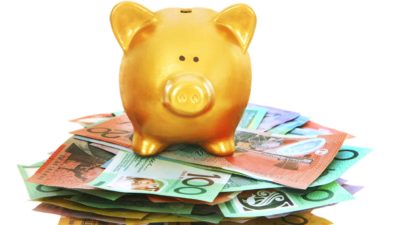Headline: The US market fell 3.5% last night. We're in for a tough ride today.
Well, that's not the actual headline. Sub-editors are busily preparing the "$XX billion wiped off the ASX" headlines.
CNBC is running its "Markets in Turmoil" graphic.
Again.
Here we go.
Again.
Maybe.
Huh?
Look, no one likes falling markets.
If you're a growth investor, you've been whacked pretty hard over the past 3 – 6 months.
But most people are nursing some recent losses of some sort or another, regardless of investing style.
Doesn't feel great, does it?
Worse when the headlines are shouting at you, reminding you of what we're going through.
Me?
I've been towelled up pretty well recently.
I don't own any banks or energy companies – two sectors that have done better than most, in the past few months.
Worse, I own some companies the market has taken a serious dislike to.
It sucks.
(Not a term you'll find in the finance textbooks, but I think it's the right one.)
And sometimes, like many of you, I just want the pain to stop.
"Not again…" I think.
I mean, how much can a koala bear?
Be honest… you've been tempted to sell, right?
And wait until the coast is clear.
Like during the onset of the COVID pandemic in March 2020 when the market fell almost 40% in just over a month.
"Stop the ride… I want to get off!", right?
And then, when the coast was…
What's that?
The coast never really got clear?
Meanwhile, the market went past the pre-COVID high, and kept going?
Well, that's unfortunate.
And the people who were 'waiting' for it?
They missed out on the mother of all rallies.
See, here's the thing: you don't get to choose how the market operates.
All you can do is play the cards you're dealt.
It would be lovely if share prices just stayed low, and then we were told when it was time to invest again.
Lovely… but not bloody likely.
And, frankly, if everyone got the same memo, prices would still skyrocket by the time we got to buy, anyway.
Of course, it would be great to sell at the top and then buy at the bottom.
The problem is that those two points are only visible in hindsight. By which time it's too late.
Seriously… there is no crystal ball. There is no secret formula. There is no way to 'outsmart' the mob when it comes to market timing.
Ask those who missed out as the All Ords jumped by more than 60% between March 2020 and August 2021 how their strategy turned out.
Now, ask those who just stayed invested how that turned out.
Actually, you don't have to – I just told you.
And then let's zoom out. The All Ordinaries Index (ASX: XAO) is up 56% (including dividends) over the past five years.
It's up 163% over the last 10 years.
Those numbers include COVID and the recent slump.
Over the last 30 years?
Well, in the three decades to June 30, 2021 (the latest numbers we have) the Australian sharemarket turned $10,000 into $160,000, according to fund manager, Vanguard.
Using what complicated strategy?
What market timing approach?
Nothing.
No, not 'nothing': Nothing.
With a capital N.
The strategy was to leave it the hell alone.
Harder than you'd imagine to actually do.
But easy as pie to implement.
Now, here's what you need to hear:
You need to stop trying so hard.
Stop trying to be smarter than the next guy.
Stop trying to 'outsmart' the market by timing your buying and selling.
Stop trying to guess which company, sector or style is going to gain the market's favour in the next six weeks or six months.
Stop hitting 'refresh' on your broker's website, or Google Finance.
Stop obsessing over small movements that will be inconsequential over the long term.
But, but, but…
Why not get out until the coast is clear?
We've covered, that, above.
What about buying the dip?
Well, if the market goes up, while you're holding cash, by the time the 'dip' comes you might well have been better off being invested the whole time, anyway.
(Plus, when are you going to buy the dip? What if it keeps falling? You're going to wait until the coast is clear? See above.)
I know you want to be smarter than the average bear.
I know you want to avoid volatility and losses.
I know you want to 'lock in your profits'.
I get it.
But what I'm saying is that wanting them, and being able to actually do them, are different things.
Perhaps more importantly, be careful what you wish for – you could have protected yourself against losses by going to cash in March 2020… and missing that huge, strong rally.
Or you could have 'waited until the coast is clear' while the 'Do Nothing' strategy turned $10,000 into $160,000 over 30 years.
I mean, hey… if you didn't want a $150,000 profit, you could have spent the last 30 years going for it.
Trading away.
Buy. Sell. Buy. Sell. Time the market. Buy the dips.
It might've even worked.
Maybe.
It might work this time.
Maybe.
You might even feel smarter than me, who's suffering losses right now.
But seriously… is your active strategy – trying to be the Hare – really going to beat my Tortoise?
Given the market tends to rise over time?
Given we can't know when the next slump – or boom – is coming, how long it'll last, or when the coast will be clear?
Given that, over the last 30 years, $10,000 became $160,000 by doing… Nothing?
Pascal suggested that "all of humanity's problems stem from man's inability to sit quietly in a room alone".
It isn't a big leap to suggest than many investors' problems stem from our inability to leave well enough alone.
Bottom line:
I've never 'gone to cash' in my life.
I hate having cash on the sidelines, because I know, historically, the market goes up somewhere around 10% a year, on average, so every year I'm not invested, I'm potentially missing out on that gain, while I wait for a dip that might not come.
I'm not letting my ego take over by trying to be 'smarter than the other guy or girl'.
I'm putting the odds on my side.
I'm trying to be roughly right, most of the time, knowing that the long term compound results of that strategy have been astonishingly good.
No, not good.
Great.
You want to beat the market at its own game? Be my guest.
Me?
There are no guarantees. We can't know the future.
But we can look at the past, and see what trends we expect will continue, over time.
So I'm playing my own game.
A game that I reckon has extraordinarily good odds of a great long-term outcome.
Choose carefully.
Fool on!









